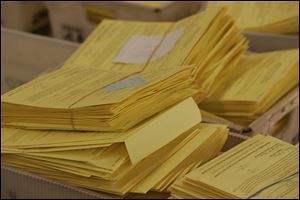
Ohio Senate bill cuts time for voting absentee, early
5/25/2011
The bill seeks to reduce the number of last-resort provisional ballots cast on Election Day and sets statewide standards fro when they will and won't be counted.
COLUMBUS -- Ohioans would have less time to vote absentee and early, and counties would be barred from mass-mailing applications for ballots to registered voters under a bill that cleared the Senate Tuesday.
Senate Bill 148, passed strictly with Republican support, seeks to reduce the number of last-resort provisional ballots cast on Election Day and sets statewide standards for when they will and won't be counted. The bill would let voters for the first time register and update their addresses on the Internet.
"According to an informal survey of Ohio's county boards of elections, over half of the provisional ballots cast in the last general election were due to a voter moving or changing their name without notifying their board of elections prior to election day," said the bill's sponsor, Sen. Mark Wagoner (R., Ottawa Hills).
The bill will now vie for supremacy with the vision of election reform that the House passed last week.
Both bills drew allegations that the measures were designed to undercut the vote in urban areas where Democrats have stronger support, among them a provision clarifying that a vote cast at the right polling place but at the wrong table within that polling place will not count.
"The fact that there have been so many reductions of polling places throughout the state and a voter may be in the right location but at the wrong precinct, the notion that a citizen's vote would not be counted is ridiculous," Sen. Nina Turner (D., Cleveland) said.
The Senate bill would reduce the 35-day window in current law for voters to cast absentee ballots by mail or in person prior to the election. This is designed to eliminate a five-day overlap between the absentee voting window and registration deadline when voters could simultaneously register and cast a ballot.
The absentee window would be shortened to 21 days before the election and the window for early in-person voting would be reduced to 16 days. Early in-person voting days, however, would be limited to Mondays through Fridays from 8 a.m. to 6 p.m. and Saturdays from 8 a.m. to noon. Early voting would end three days before Election Day.
This compares to 16 and 10-day windows for absentee and early voting, respectively, under the House version.
Many of the changes in the Senate version had been requested by Secretary of State Jon Husted, Ohio's top elections official. Among them was the provision prohibiting county boards of elections from mass-mailing applications for absentee ballots to all registered voters.
The handful of urban counties that do this, including Lucas, have defended it as a tool to reduce the length of lines on Election Day while smaller counties complained they don't have the resources to do the same.
"We must recognize that this process should be consistent among all counties to ensure fairness and equal access to the polls, so that the residents of one county do not have advantage over the residents of another," Mr. Wagoner said.
The Senate bill does not address the timing of next year's presidential primary election, currently scheduled for March.
The House bill has already thrown in the towel on Ohio being ready for an early primary and would instead move it back to May.
This is, in part, a recognition that lawmakers have yet to begin redrawing population-adjusted state legislative and congressional districts that candidates must run in next year.
Contact Jim Provance at: jprovance@theblade.com or 614-221-0496.